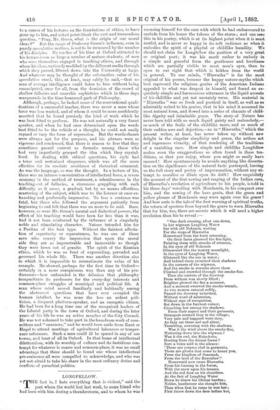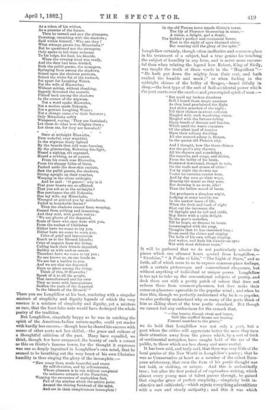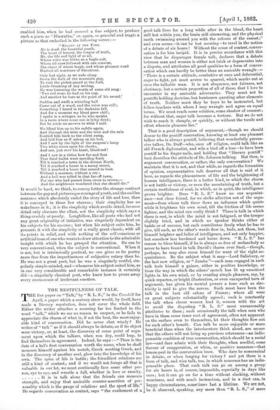LONGFELLOW.
rr I"HE fact is, I hate everything that is violent," said the poet whom the world lost last week, to some friend who had been with him during a thunderstorm, and to whom he was
excusing himself for the care with which he had endeavoured to exclude from his house the tokens of the storm ; and one sees this in his poetry, which is at its highest point when it is most restful, and is never so happy in its soft radiance as when it embodies the spirit of a playful or childlike humility. We should not claim for Longfellow the position of a very great or original poet ; it was his merit rather to embody in a simple and graceful form the gentleness and loveliness which are partially visible to most men's eyes, than to open to our sight that which is hidden from the world in general. To our minds, " Hiawatha " is far the Most original of his poems, because the happy nature-myths which best expressed the religious genius of the American Indians appealed to what was deepest in himself, and found an ex- quisitely simple and harmonious utterance in the liquid accents of his childlike and yet not unstately verse. His material in " Hiawatha " was so fresh and poetical in itself, as well as se admirably suited to his genius, that in his mind it assumed its most natural form, and flowed into a series of channts of child- like dignity and inimitable grace. The story of Nature has never been told with so much liquid gaiety and melancholy,— so much of the frolic of the childlike races, and so much of their sudden awe and dejection,—as in" Hiawatha," which the present writer, at least, has never taken up without new delight in the singular simplicity and grace, the artless art and ingenuous vivacity, of that rendering of the traditions of a vanishing race. How simple and childlike Longfellow makes even the exaggerations so often found in these tra- ditions, so that you enjoy, where you might so easily have sneered ! How spontaneously he avoids anything like disserta- tion on the significance of the natural facts portrayed, leaving us the full story and poetry of impersonation, without any at- tempt to moralise or dilate upon its drift ! How exquisitely the account of the first sowing and reaping of the Indian corn, of Hiawatha's revelation of agriculture to his people, is told in his three days' wrestling with Mondamin, in his conquest over him, and the sowing of the bare grain, that the green and yellow plumes of Mon damin may wave again over his grave ! And how eerie is the tale of the first warning of spiritual truths, the return of spectres from beyond the grave to warn Hiawatha that for him, too, there are secrets which it will need a higher revelation than his to reveal :—
" One dark evening, after sun-down,
In her wigwam Laughing Water Sat with old Nokomis, waiting For the steps of Hiawatha Homeward from the hunt returning.
On their faces gleamed the fire-light, Painting them with streaks of crimson, In the eyes of old Nokomis Glimmered like the watery moonlight, In the eyes of Laughing Water, Glistened like the sun in water ; And behind them crouched their shadows In the corners of the wigwam, And the smoke in wreaths above them Climbed and crowded through the smoke-flue.
Then the curtain of the doorway From without was slowly lifted ; Brighter glowed the fire a moment, And a moment swerved the smoke-wreath, As two women entered softly, Passed the doorway uninvited, Without word of salutation, Without sign of recognition, Sat down in the farthest corner, Crouching low among the shadows.
From their aspect and their garments, Strangers seemed they in the village ; Very pale and haggard were they, As they sat there sad and silent, Trembling, cowering with the shadows.
Was it the wind above the smoke-flue, Muttering down into the wigwam ?
Was it the owl, the Koko-koho, Hooting from the dismal forest ?
Sure a voice said in the silence : These are corpses clad in garments, These are ghosts that come to haunt yon, From the kingdom of Ponemah, From the land of the Hereafter !'
Homeward now came Hiawatha From his hunting in the forest, With the snow upon his tresses, And the red deer on his shoulders.
At the feet of Laughing Water Down he threw his lifeless burden; Nobler, handsomer she thought him,
Than when first he came to woo her;
First threw down the deer before her, As a token of his wishes, As a promise of the future.
Then he turned and saw the strangers, Cowering, crouching with the shadows ; Said within himself, Who are they ? What strange guests has Minnehaha ?'
But he questioned not the strangers, Only spake to bid them welcome To his lodge, his food, his fireside.
When the evening meal was ready, And the deer had been divided, Both the pallid guests, the strangers, Springing from among the shadows, Seized upon the choicest portions, Seized the white fat of the roebuck, Set apart for Laughing Water, For the wife of Hiawatha; Without asking, without thanking, Eagerly devoured the morsels, Flitted back among the shadows In the corner of the wigwam.
Not a word spake Hiawatha, Not a motion made Nokomis, Not a gesture Laughing Water ; Not a change came o'er their features ; Only Minnehaha softly Whispered, saying, They are famished; Let them do what best delights them ; Let them eat, for they are famished.'
. . . .....
Once at midnight Hiawatha, Ever wakeful, ever watchful, In the wigwam dimly lighted By the brands that still were burning, By the glimmering, flickering fire-light, Heard a sighing, oft repeated, Heard a sobbing, as of sorrow.
From his conch rose Hiawatha, From his shaggy hides of bison, Pushed aside the deer-skin curtain, Saw the pallid guests, the shadows, Sitting upright on their conches, Weeping in the silent midnight.
And he said : 0 guests ! why is it That your hearts are so afflicted, That you sob so in the midnight ?
Has perchance the old Nokomis, Has my wife, my Minnehaha, Wronged or grieved you by unkindness, Failed in hospitable duties ?'
Then the shadows ceased from weeping,
Ceased from sobbing and lamenting, And they said, with gentle voices : 'We are ghosts of the departed, Souls of those who once were with you.
From the realms of Chibiabos Hither have we come to try you, Hither have we come to warn you.
Cries of grief and lamentation Reach us in the Blessed Islands ; Cries of anguish from the living, Calling back their friends departed, Sadden us with useless sorrow.
Therefore have we come to try you ; No one knows us, no one heeds us.
We are but a burden to you, And we see that the departed Have no place among the living.
Think of this, 0 Hiawatha!
Speak of it to all the people, That henceforward and for ever They no more with lamentations Sadden the souls of the departed In the Islands of the Blessed.'"
There you see Longfellow at his best, rendering with a singular mixture of simplicity and dignity legends of which the very essence is a mixture of simplicity and dignity, yet a mixture so rare, that the least false note would have destroyed the whole poetry of the tradition.
But Longfellow, singularly happy as he was in catching the spirit of the American-Indian nature-myths, could yet render with hardly less success,—though here be shared his success with scores of other poets not less skilful,—the grace and culture of a thoughtful criticism of the past. Many have equalled, we think, though few have surpassed, the beauty of such a sonnet as this on Giotto's famous tower, for the thought it expresses was one so deeply ingrained in Longfellow's own mind, that he seemed to be breathing out the very heart of his own Christian humility in thus singing the glory of the incomplete :—
"How many lives, made beautiful and sweet By self-devotion, and by self-restraint, Whose pleasure is to run without complaint On unknown errands of the Paraclete, Wanting the reverence of unshodden feet, Fail of the nimbus which the artists paint Around the shining forehead of the saint, And are in their completeness incomplete !
In the old Tuscan town stands Giotto's tower, The lily of Florence blossoming in stone,— A vision, a delight, and a desire,
The builder's perfect and centennial flower, That in the night of ages bloomed alone, But wanting still the glory of the spire."
Longfellow certainly, though often ineffective and common-place in his treatment of a subject, had a true genius for touching the subject of humility in any form, and is never more success- ful than when relating the legend how Robert, King of Sicily, was taught the truth of those words in the " Magnifica "— " He hath put down the mighty from their seat, and hath exalted the humble and meek ;" or when finding in the midnight chimes of the belfry of 13rnges,—heard fitfully in sleep,—the best type of the sort of half-accidental power which the poet exerts over the careless and preoccupied spirit of man :— "But amid my broken slumbers Still I heard those magic numbers As they loud proclaimed the flight And stolen marches of the night ; Till their chimes in sweet collision Mingled with each wandering vision. Mingled with the fortune-telling Gipsy-bands of dreams and fancies, Which amid the waste expanses Of the silent land of trances Have their solitary dwelling. All else seemed asleep in Bruges, In the quaint old Flemish city.
And I thought, how like these chimes Are the poet's airy rhymes, All his rhymes and roundelays, His conceits, and songs, and ditties, From the belfry of his brain, Scattered downward, though in vain, On the roofs and stones of cities ! For by night the drowsy ear Under its curtains cannot hear, And by day men go their ways, Hearing the music as they pass, Bat deeming it no more, alas ! Than the hollow sound of brass.
Yet perchance a sleepless wight, Lodging at some humble inn In the narrow lanes of life, When the dusk and hush of night Shut out the incessant din Of daylight and its toil and strife, May listen with a calm delight To the poet's melodies,
Till he hears, or dreams he hears;
Intermingled with the song,
Thoughts that he has cherished long ;
Hears amid the chime and singing The bells of his own village ringing, And wakes, and finds his slumbrous eyes Wet with most delicious tears."
It will be gathered that we do not particularly admire the pieces which one oftenest hears quoted from Longfellow,— " Excelsior," "A Psalm of Life," "The Light of Stars," and so forth, all of which seem to us to express common-place feelings, with a certain picturesque and conventional eloquence, but without anything of individual or unique power. Longfellow is too apt to take up the conventional subjects of poetry, and deck them out with a pretty patch of colour that does not redeem them from common-plakeness, but does make their common-placeness agreeable to the popular mind ; and when he does this, though we perfectly understand why he is so popular, we also perfectly understand why so many of the poets think of him as illiug short of the true poetic standard. But though we cannot feel any enthusiasm for the remark that,
" —Oar hearts, though stout and brave, Still like muffled drums are beating Funeral marches to the grave," we do hold that Longfellow was not only a poet, but a poet whom the critics will appreciate better the more they turn their attention away from the pieces which, by a sort of trick of sentimental metaphor, have caught hold of the ear of the public, to those which are less showy and more restful. It has been said, and truly said, that there was very little of the local genius of the New World in Longfellow's poetry ; that he was as Conservative at heart as a member of the oldest Euro- pean aristocracy, that even the form of his poetic thought was not bold, or striking, or unique. And this is undoubtedly true ; but after the first period of «d captandum writing, which almost every young man of talent passes through, he gained that singular grace of perfect simplicity,—simplicity both in- stinctive and cultivated,—which rejects everything adventitious with a sure and steady antipathy ; and this it was which enabled him, when he had secured a fine subject, to produce such a poem as "Hiawatha," or, again, so graceful and tragic a picture as that embodied in the following verses :—
"KILLED AT THE FORD.
He is dead, the beautiful youth, The heart of honour, the tongue of truth,
He, the life and light of us all,
Whose voice was blithe as a bugle.call, Whom all eyes followed with one consent, The cheer of whose laugh, and whose pleasant word Hushed all murmurs of discontent.
Only last night, as we rode along Down the dark of the mountain gap, To visit the picket-guard at the ford, Little dreaming of any mishap, He was humming the words of some old song: 'Two red roses he had on his cap, And another he bore at the point of his sword.'
Sudden and swift a whistling ball Came out of a wood, and the voice was still; Something I beard in the darkness fall, And for a moment my blood grew chill ; I spake in a whisper, as he who speaks
In a room where some one is lying dead ;
But he made no answer to what I said.
We lifted him up to his saddle again, And through the mire and the mist and the rain Carried him back to the silent camp, And laid him as if asleep on his bed, And I saw by the light of the surgeon's lamp Two white roses upon his cheeks, And one, just over his heart, blood-red !
And I saw in a vision how far and fleet That fatal bullet went speeding forth Till it reached a town in the distant North, Till it reached a house in a sunny street, Till it reached a heart that ceased to beat Without a murmur, without a cry ; And a bell was tolled in that far-off town,
For one who had passed from cross to crown,—
And the neighbours wondered that she should die."
It would be hard, we think, to convey better the strange contrast between the gay and picturesque courage of youth, and the sudden sentence which absolutely ended the story of life and love, than it is conveyed in these few stanzas ; their simplicity has no nakedness in it ; it is the simplicity which avoids detail, because detail only obscures the effect, not the simplicity which says a thing crudely or poorly. Longfellow, like all poets who had not any great originality of initiative, was singularly dependent on his subjects for his success ; but when his subject suits him, he presents it with the simplicity of a really great classic, with all its points in relief, and with nothing of the self-conscious or artificial tone of one who wants to draw attention to the admirable insight with which he has grasped the situation. He can be very conventional, when the subject is conventional. When it is not, but is intrinsically poetical, no one gives us its poetry more free from the impertinences of subjective extasy than he. He was not a great poet, but he was a singularly restful, sin- gularly simple-minded, and—whenever his subject suited him, as in one very considerable and remarkable instance it certainly did—a singularly classical poet, who knew how to prune away every excrescence of irrelevant emotion.
















































 Previous page
Previous page